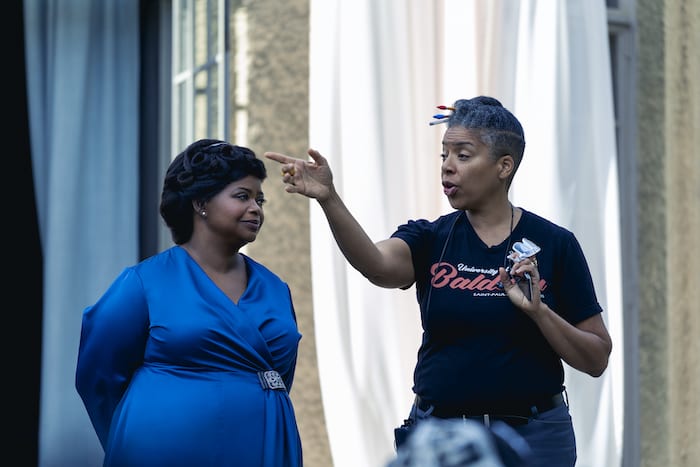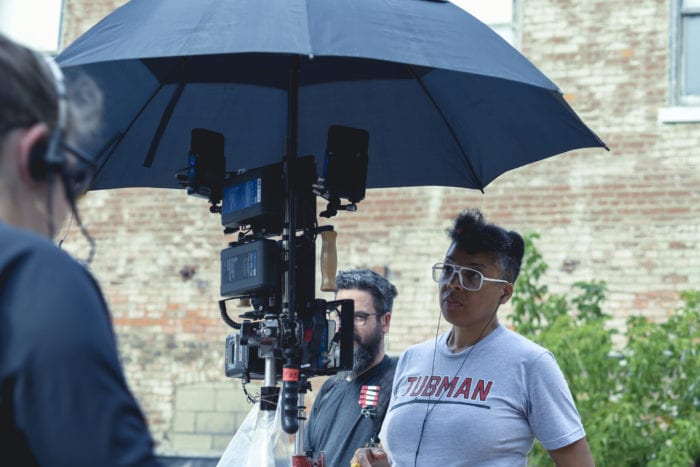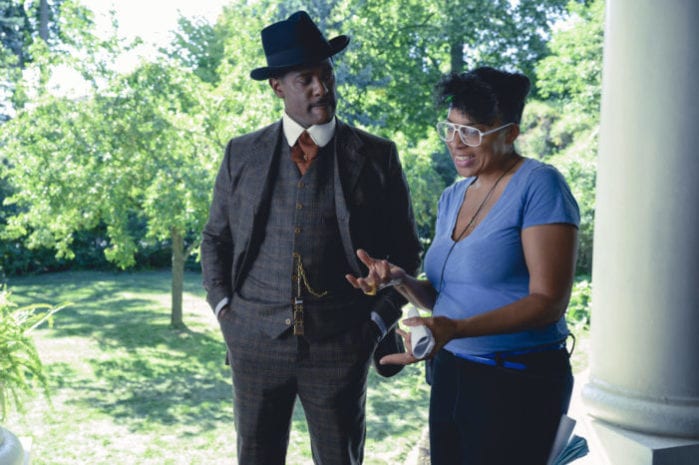
It took more than 20 years to get from writing her first film to directing one of the season’s most anticipated dramas. She’s just getting started.
“Are you wearing a black hat?”
Boston director DeMane Davis is texting me from the other side of a restaurant near Kenmore Square. We’ve met a few times prior to this planned hangout and network on the socials, but I’m early and trying to avoid interrupting a meeting she’s having before our interview. I can tell from afar that Davis, in fashionable thick red frames with sweeping hand gestures to rival any maestro or Sopranos character, is the sort of collaborative artist who likes to hold court. But since one of the reasons I wanted to profile her in the first place is that she deserves more recognition as one of New England’s most active burgeoning creative talents behind the camera today, I don’t want to just walk up to her crew.
Still, Davis insists.
“Come over,” she texts. “You need to meet this guy.”
A few drinks later, with her friends now chatting amongst themselves, I get an opportunity to speak with Davis at length about her work in movies and television—from her start directing low-budget films in Boston to major recent gigs, including the upcoming ballyhooed Netflix series Self Made: Inspired by the Life of Madam C.J. Walker. Few cliches are more abused than claiming someone who is making big moves is down to earth, but Davis, who was born and raised in Roxbury, remains not just a resident and product of the Hub, but hopes to use her momentum to get more idiosyncratic Boston stories into Hollywood. Within minutes, we’re discussing her coming of age and how she forged her 1997 feature-length debut using raw ingenuity and local friends while working as a copywriter.

“I initially thought I would write the great American novel,” Davis says about her early years as a Metco student, taking buses to Wellesley and back. “What I knew, though, even back in middle school, was that writers don’t make any money, but there was an art class where, for some reason, the teacher had us make advertisements. I created Elmer’s Glue pancake mix and wrote a tagline, and [the teacher] said, ‘You know, you could work in advertising. They make like $40,000 a year.’ And that just burned in my brain. I figured I could work in advertising during the day, and write the great American novel at night.”
After a brief stint studying public relations at BU—“They took all my money and I left after a year,” Davis says—she moved to New York in the mid-’90s to dive into the advertising world. At the same time, she remained close with her family in Warren Gardens in Roxbury, and on one inspirational visit back home glimpsed the bedroom wall of her niece, then only a teenager, which was covered in funeral programs.
“Two girls were shot in the head as they sat in their car,” Davis recalls. “One of her best friends was stabbed in school and died. She was 16 and had lost four friends in a year and a half and had never spoken about it. I was overwhelmed.”
From the experience, Davis devised the concept for a screenplay: “If we continue to kill each other, there won’t be any black people left.” That led to writing her first script along with a business plan to help raise enough money to shoot Black & White & Red All Over, a serious but simple feature with just six characters and one location. “There were no craft services,” Davis jokes. “My mother made mac and cheese.”
Having left what she describes as a phenomenal apartment and ad campaigns for Snapple and other leading brands she was working with in New York, Davis jumped into her second project in 1997 after getting admitted to the Sundance Institute, a nonprofit “that actively advances the work of independent storytellers in film and theatre.” On the strength of her debut, Davis and her art director were flown to Utah, where she began working on Lift, a unique Boston drama about shoplifting that was released in 2001. With help from her original Black & White & Red All Over crew plus new collaborators from Sundance and other contacts—one friend gifted several minutes of pre-drone aerial footage he recorded during a commercial shoot he worked on—Davis returned with a solidly professional sophomore project. Lift even featured a then-unknown Kerry Washington, who went on to star as the lead Olivia Pope in the ABC drama Scandal.
“It’s kind of amazing DeMane,” Washington recently wrote on Twitter. “YOU gave me a shot at being a leading lady for the first time in LIFT. That eventually led to me being Olivia Pope. Ava [DuVernay] got inspired at Scandal to create her own television empire like Shonda [Rhimes]… FULL. CIRCLE.”
“You know what you want as an outcome, but you have to be able to communicate that to different people,” Davis says about her strategy as a director. “Then you have to allow for them to bring their expertise and their gifts, and you have to do that in a way that lifts them up, so they can do more of that work in the future.”
For all the people Davis has brought into her camp—“I’m building my team every day,” she says, “it’s all about what kind of person you are, and who you attract”—she’s also had a number of trailblazers help lift her up. Her relationship with Emmy Award-winner Ava DuVernay led to her working on the epic Oprah Winfrey Network show Queen Sugar and The Red Line on CBS. For Rhimes’ Shondaland, Davis has directed episodes of Station 19, For The People, and How to Get Away With Murder!
“People want to pigeonhole you so they can make assumptions and say, I know where you fit—over here,” Davis says. “I don’t want to fit in one place. I want to be able to do all of these things—they all feed into one another. Everything I’ve done up to this point is cumulative; I just try to find something I love in everything I do.”
“Some people are driven and just won’t stop,” says Davis’ nephew, Daniel Laurent, a well-known Boston hip-hop artist who played a small role in Lift. “D dug into the process and the business all while freelancing and doing advertising spots and commercials—even working at the YMCA with kids, but all the while still having a kill-what-you-eat mentality, and to see her actually feasting off hunting is special. She is a woman, unapologetically, and for the advancement of her people and making real changes from the inside. I’m in awe.”

After more than 20 years in the cut, networking and sharpening her skills on a range of projects, Davis was entrusted with her biggest challenge yet, to direct and produce on the set of Self-Made. The story of Madam C.J. Walker, an African American hair care entrepreneur who became one of the country’s first female self-made millionaires, the four-part Netflix series is based on the book, On Her Own Ground, written by Walker’s great-great-granddaughter A’Lelia Bundles, and stars Academy Award-winner Octavia Spencer, as well as Tiffany Haddish, Blair Underwood, and other bigs.
“I first heard of Madam in elementary school,” Davis says. “I was fascinated by her story—her parents were slaves, she was married at 14, she was widowed and a single mother at 19. … She started going door to door at a time when black people were being lynched. … She fucking hustled.”
The project hit home. “Also,” Davis says, “my first real job was as a gofer at a hair salon downtown. For a hot minute, I wanted to be a hairdresser. I liked how women would walk in head-down, with their shoulders hunched, but they would walk out transformed and full of emotion. I liked that someone I knew and worked with did that for somebody.”
When Davis heard a Walker project was in development, she began to ask around. “I said, ‘I’m black, I’m a woman, I have this in me, and I want to be a part of it,’” she says.
As it has in the past for Davis, initiative led to meetings, which spurred her getting the gig as one of two directors (the other director, Kasi Lemmons, recently spoke with DigBoston film critic Jake Mulligan, who will publish their interview in the coming weeks). She wasn’t alone in committing to Self-Made for profoundly personal reasons.
“You’re talking about people who turned down jobs [on other shows] with 10 or more episodes because they cared, because they wanted to do this,” Davis says. “Everybody’s invested—everybody knows the story, and a lot of the people on the set are black women who have black hair and know what that’s like.”
There’s already talk about potential awards for the series. Davis, though, is too humble to go there. For now, she’s hoping to find enough time between shooting other projects to watch Self-Made with friends when it premieres on March 20.
“This is all a gift,” Davis says. “My neighbors think I have a roommate because I will [get good news about a project] on the phone and scream out loud, ‘Can you believe this shit?!?’
“Really, it’s a gift.”
A Queens, NY native who came to New England in 2004 to earn his MA in journalism at Boston University, Chris Faraone is the editor and co-publisher of DigBoston and a co-founder of the Boston Institute for Nonprofit Journalism. He has published several books including 99 Nights with the 99 Percent, and has written liner notes for hip-hop gods including Cypress Hill, Pete Rock, Nas, and various members of the Wu-Tang Clan.

